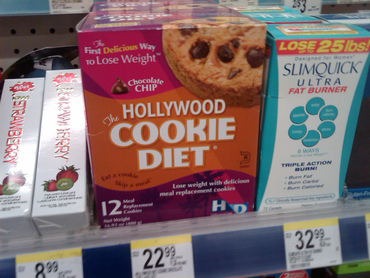 So back in my "Nutrition 101" days of my Naturopathic medical education, I learned the commonly taught old school nutrition idea of: "weight loss = more calories burnt than consumed" So that's it, huh? Eat less calories, burn more calories and weight loss will be a sure thing? Well, most of us know it's just not that easy. In fact, many find that they gain weight during and after dieting, even if they increase their activity level. So what's going on?! The fact of the matter is, only 1 in 6 dieters keeping the weight off (after a year). So why can't we all just follow that easy formula and lose those extra pounds?! ...because it just isn't so simple. We are a little more complex than calorie consuming and burning machines (but you probably knew that already). An article published last week in the Journal of the American Medical Association provides a little insight into some of those dieting and weight loss complexities. The publishing authors looked at overweight research participant using three different diet and weight loss programs and measured their success. The three diets were low-fat, low glycemic and low carbohydrate (high protein). Under carefully monitored in-patient hospital settings, the low glycemic dieters burned an average of 200 calories per day more than the low fat. The low carbohydrate dieters lost 300 calories more per day than the low fat dieters but saw an increase in blood levels of inflammatory markers (cortisol and CRP). So what does this all mean?! Just follow the diet where people burned the most calories while being constantly monitored in the hospital? Well, that doesn't sound like a very enjoyable diet program to me. If you're considering a weight loss-focused diet and exercise program, think about getting an expert involved to guide your path to success. If you haven't heard by now, my past 'slim down & happy up' program sessions have provided women (& men) with guided, individualized meal planning, diet guidelines and exercise recommendations. Combined with unique natural formulas that I craft specifically to each participant, this really is my all-in-one tool to address weight loss and stress reduction for long-term success. Registration for our next session opens Monday, August 19th, full details here. Join us for 3 months, and just see what a profound impact you and I can have on your health and quality of life!
0 Comments
I was asked to write an article without all the fancy scientific words and research. I welcome a challenge, and here you go. People frequently want to talk with me about diseases (that maybe they or a family member have), treatment options, herbal information or advice. And it's really understandable- I am required to fit all that information in there. The only problem, because I truly do want to help people, is that "diagnosing or treating" is something that only a doctor can do for a patient. Providing that information without having that relationship gets me into hot water. So, here's a mini-series (I'm guessing only two, so a "very mini" series) on what I'm seeing as the top things that doctors, public health officials and medical researchers are saying to do for your health. Step 1: Exercise. It appears to matter less what type, or how much, or for how long. As long as your moving on a regular basis, those in the know say that may experience such "side effects" as weight loss, mental clarity, more stable mood, better digestive functioning, less fatigue, improved heart health (and pretty much every other organ as well) and decreases the effects of most types of chronic diseases- just to name a few. So, move your way to health. And watch the below video for some animated inspiration. When it comes down to it, most people just want to know how to be healthy. And, of course, we all have our unique set of medical concerns- but exercise can help most of those (and has been shown in research). Now, 30 minutes of walking as suggested in the above video will be easy and doable by most readers here, but consult a doctor if you're considering a drastic change to your exercise routine (or beginning one for the first time). I won't be held responsible for anyone's kick boxing-induced injuries.
If all of the above information is still not convincing, then either find what works for you. Some healthcare practitioners are great at helping folks make positive changes to their daily routine (I like to think of myself as one in training). For yet further information about exercise and research-based recommendations, check out Harvard's School of Public Health article "The Benefits of Physical Activity." Currently, about 10% of preschool children and 19% of children ages 6-11 are obese. New research from the Archives of Pediatrics & Adolescent Medicine has found a link between specific infant growth benchmarks and a high risk for childhood obesity. This isn't as straightforward as "fat babies become fat kids." Many thin and average sized adults started out as pudgy babies. And many school-aged children and adults begin struggling with weight gain well after their baby years. What the researchers found was that the greatest risk for developing obesity was growing across three major percentiles (25%, 50% and 75%) between ages 1 to 6 months old. So those babies who are most likely to become obese by age 11 years are those who start out as relatively small infants ( under 25th percentile or more than 75% are larger than him/her) in the first month of life, but then grows rather fast and tips the tables towards being one of the larger babies (now over the 75th percentile or less than 25% of others are larger than him/her) by the sixth month of life. So little bitty babies who become big pudgy babies quickly are those most likely to be obese by grade school. The authors have made the connection, but not explained why that trend continues int childhood. This is a multi-factorial issue, with some of the reasons for the relatively fast weight gain outlined by the authors being: -Less mobility: these babies may be in strollers, car seats or other stationary positions for longer periods of time. -Over-fed or fed "incorrectly" such as juice in bottles, solid foods introduced early (before 6 months). Now, nobody's talking about signing these infants up for Jenny Craig for Babies (which I'm thankful isn't even a real thing). But, like the rest of us, some attention to food and activity goes a long way. If the rest of the family eats healthy, wholesome meals and makes time for exercise and activities, these will surely be healthy attributes of even the pudgiest baby.
Another suggestion offered by consultant pediatrician Dr. Joanna Lewis is for the family to all sit down and eat together, as "research has shown that obesity is less common in children raised in families that have frequent meals together at home." So without thinking that this research defines or limits anyone's potential for health, instead see this as allowing us to understand how influential to our health early eating and activity habits are. Thank you for reading! What was your favorite school lunch item? I'll admit mine was the chocolate milk; less than healthy choices such as mine may soon be a thing of the past. School lunches are in the cross-hairs of the current legislative activity aimed at improving children's nutrition. Last year, Obama signed the Healthy, Hunger-free Kids Act, showing how concerning our children's lunchtime food choices are (even the presidents getting involved here!). Today's Washington Post featured an article titled, "School lunch debates heat up," where author Jennifer LaRue Huget asks: "...whose responsibility it is to decide what to feed America’s schoolchildren, who should determine what’s healthful and what’s not, and what role [do] parents play in that decision-making process. We also have to consider whether serving nutritionally sound meals at school is itself part of the curriculum; teaching kids what foods are best for their bodies by offering such foods at lunchtime." So whose responsibility is it that kids eat healthy lunches?
Shouldn't it be everyone's? If healthy meal choices are made at home, then children will (by extension) bring healthy lunches to school. And for those who are provided meals at school (for parental convenience and/or reduced-price), then shouldn't this be where the schools step in with healthy choices? If childhood (and adult) epidemic levels of obesity and diabetes are to be reversed, we need to take what kids eat seriously. When nutrition becomes a value that we as a society act upon, only then will children benefit and chronic disease stats decline. Until that time, Lunchables will continue to be the top lunchtime trading commodity, and our following generations will grow evermore unhealthy and overweight. I love to hear all of your comments, questions, and suggestions for upcoming articles. Feel free to contact me any time! Thanks for reading! -Angela |
Archives
June 2024
Categories
All
|
about the doc |
patient infocontact |
|
Privacy Policy
© Copyright 2011-2024, Dr. Angela Cortal ND LLC website content is for educational purposes only and is no substitute for medical advice (see the Terms of Use Agreement for this site), you must establish a doctor-patient relationship to receive that! |

